“You Got the Power, I’ve seen you use it, they say you don’t have it, that’s how you lose it!” Mitch Margo from his song California Reggae Debate (You Got the Power)
We do have the power, and there are amazing people doing great work to make things better. The Climate Listening Project is a healing listening effort from award-winning documentarian Dayna Reggero to create safe spaces to connect and share hopeful conversations on climate change impacts and move forward towards community solutions. Dayna works within communities to listen and partner with nonprofit organizations and groups to help share the stories that need to be heard. She is working with Paula Swepson-Avery, Executive Director of The West Marion Community Forum. Paula’s quote on the Forum website states: “The best thing about the Forum is that it allows you to dream.”The mission of the Forum is to enhance the quality of life of its residents in McDowell County, North Carolina. This is done by showing compassion, advocating for policy and systems change, promoting economic development, sharing resources, empowering youth, and creating equitable outcomes for all.
In these times of uncertainty, I think we all find ourselves feeling helpless as to what we can do to make a difference. It is therefore more important than ever that we communicate, and truly listen to one another within our communities so that we can work together to be agents of change. Environmental justice and social justice must be supported and given priority in the conversations of those in government, organizations and with the citizenry. On this episode of TMSOG podcast, we talk to two amazing women who work to bring these important issues to the forefront. Dayna Reggero who is a friend of TMSOG, is an award-winning filmmaker and founding director of the Climate Listening Project. Her work has been recognized for amplifying voices that often go unheard in the mainstream climate conversation. We also speak with Paula Swepson-Avery who is the Executive Director of The West Marion Community Forum. The Forum helps engage residents to help them become leaders to create change through new businesses, empowered youth, affordable housing, teaching gardens, and a community center that creates opportunities for the future. We need to be proactive and be better listeners as we have the power, and we need to use it. For more information go to climatelisteningproject.org and westmarion.org
West Marion was donated a Community building that used to be a Black school that will be used as a local resilience hub: https://mcdowellnews.com/news/local/government-politics/marion-city-council-west-marion-inc-community-center-epa-grant-hudgins-high-mountain-view/article_00ee8a70-5fd9-11ef-9850-c3b3f4657839.html
Shift Happens in Communities: https://www.shifthappenstoolkit.org/
To listen to past TMSOG shows go to https://hudsonriverradio.com/ and https://malcolmpresents.com Follow The Many Shades of Green on FB and Instagram @tmshadesofgreen and on Blue Sky @tmshadesofgreen.bsky.social. Listen to TMSOG podcasts on all major podcast apps. #RaiseYourEcoConsciousness
A Special shout out to Neil Richter for all of his help and engineering wizardry in getting TMSOG up and running each week.
TMSOG is proud to be on Feedspot’s list of the 50 Best Environmental Podcasts.



 This weeks episode takes us to the Global Women’s Climate Justice Day of Action at the UN, sponsored by the Women’s Earth and Climate Action Network (WECAN). This event was attended by women from over 50 countries. To have such a collection of amazing women in one place, who presented stories of courage and resilience in combating climate change was deeply touching. Women play a key role in adapting solutions to climate change, and it was an honor to speak with WECAN founder Osprey Lake, environmentalist visionary Sally Ranney, as well as Neha Misra founder of Solar Sister, Harriet Shugarman Executive Director of ClimateMama, Executive Director of CELF Katie Ginsberg and student Coreena, and Patricia Gualinga-Montalvo, Indigenous Leader of Ecuador, whose interview was translated by Amazon Watch’s Executive Director Leila Salazar-López. For more information visit
This weeks episode takes us to the Global Women’s Climate Justice Day of Action at the UN, sponsored by the Women’s Earth and Climate Action Network (WECAN). This event was attended by women from over 50 countries. To have such a collection of amazing women in one place, who presented stories of courage and resilience in combating climate change was deeply touching. Women play a key role in adapting solutions to climate change, and it was an honor to speak with WECAN founder Osprey Lake, environmentalist visionary Sally Ranney, as well as Neha Misra founder of Solar Sister, Harriet Shugarman Executive Director of ClimateMama, Executive Director of CELF Katie Ginsberg and student Coreena, and Patricia Gualinga-Montalvo, Indigenous Leader of Ecuador, whose interview was translated by Amazon Watch’s Executive Director Leila Salazar-López. For more information visit 
 How compassionate is the New York State Compassionate Care Act of 2014 legalizing the use of medical marijuana? My guest this week, New York State Senator Liz Krueger, a lead advocate for legalizing marijuana for both medicinal and also for recreational use, gives us some insight into the pros and cons of the current bill, and why it needs to be enhanced to allow coverage for more diseases. Senator Krueger has also sponsored the Fossil Fuel Divestment Act to limit the investment in oil and gas stocks in NYS pension funds. For more information go to: nysenate.gov/senators/Liz-Kruger or send a tweet @LizKrueger
How compassionate is the New York State Compassionate Care Act of 2014 legalizing the use of medical marijuana? My guest this week, New York State Senator Liz Krueger, a lead advocate for legalizing marijuana for both medicinal and also for recreational use, gives us some insight into the pros and cons of the current bill, and why it needs to be enhanced to allow coverage for more diseases. Senator Krueger has also sponsored the Fossil Fuel Divestment Act to limit the investment in oil and gas stocks in NYS pension funds. For more information go to: nysenate.gov/senators/Liz-Kruger or send a tweet @LizKrueger